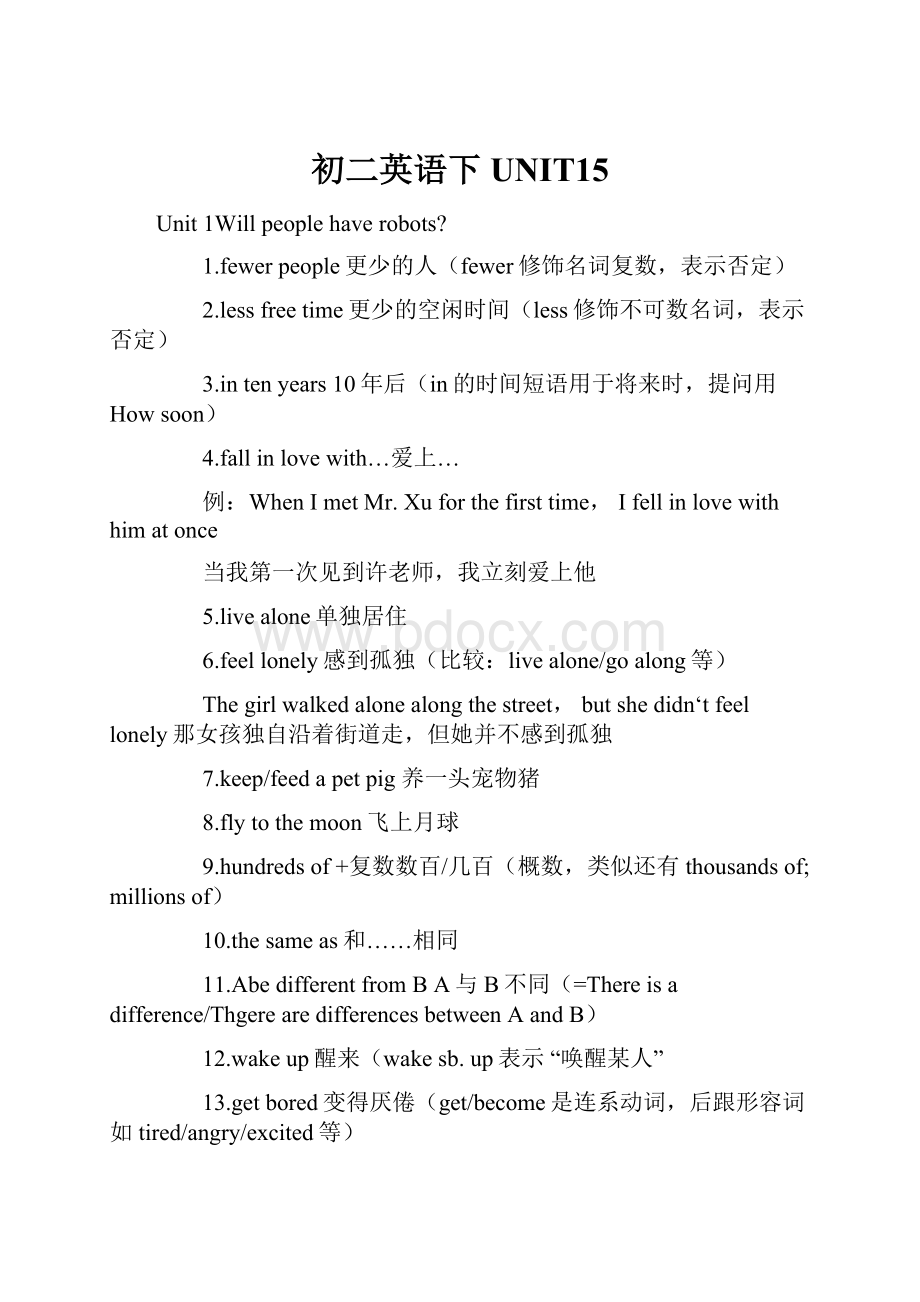初二英语下UNIT15.docx
《初二英语下UNIT15.docx》由会员分享,可在线阅读,更多相关《初二英语下UNIT15.docx(15页珍藏版)》请在冰豆网上搜索。

初二英语下UNIT15
Unit1Willpeoplehaverobots?
1.fewerpeople更少的人(fewer修饰名词复数,表示否定)
2.lessfreetime更少的空闲时间(less修饰不可数名词,表示否定)
3.intenyears10年后(in的时间短语用于将来时,提问用Howsoon)
4.fallinlovewith…爱上…
例:
WhenImetMr.Xuforthefirsttime,Ifellinlovewithhimatonce
当我第一次见到许老师,我立刻爱上他
5.livealone单独居住
6.feellonely感到孤独(比较:
livealone/goalong等)
Thegirlwalkedalonealongthestreet,butshedidn‘tfeellonely那女孩独自沿着街道走,但她并不感到孤独
7.keep/feedapetpig养一头宠物猪
8.flytothemoon飞上月球
9.hundredsof+复数数百/几百(概数,类似还有thousandsof;millionsof)
10.thesameas和……相同
11.AbedifferentfromBA与B不同(=Thereisadifference/ThgerearedifferencesbetweenAandB)
12.wakeup醒来(wakesb.up表示“唤醒某人”
13.getbored变得厌倦(get/become是连系动词,后跟形容词如tired/angry/excited等)
14.goskating去滑冰(类似还有gohiking/fishing/skating/bikeriding等)
15.lotsof/alotof许多(修饰可数名词、不可数名词都可以)
16.attheweekends在周末
17.studyathomeoncomputers在家通过电脑学习
18.agreewithsb.同意某人(的意见)
19.Idon‘tagree.=Idisagree.我不同意
20.onapieceofpaper在一张纸上(注意paper/information/news/work/homework/housework等常考到的不可数名词)
21.onvacation度假
22.helpsbwithsth/helpsbdosth帮助某人做某事
23.manydifferentkindsofgoldfish许多不同种金鱼
24.liveinanapartment住在公寓里/liveonthetwelfthfloor住在12楼
25.liveatNO.332,ShanghaiStreet住在上海路332号
26.asareporter作为一名记者
27.looksmart显得精神/看起来聪明
28.Areyoukidding?
你在骗我吗
29.inthefuture在将来/在未来
30.nomore=not…anymore不再(强调多次发生的动作不再发生)
31.nolonger=not…anylonger不再(强调状态不再发生)
32.besides(除…之外还,包括)与except=but(除…之外,不包括)
33.beableto与can能、会
l(beableto用于各种时态,而can只能用于一般现在时态和一般过去时态中;haveto用于各种时态,而must只能用于一般现在时态)例如:
1.Ihavebeenableto/willbeabletospeaktwolanguages.(不可以用can)
2.hadtostayathome/willhaveto(不可以用must)
34.bebigandcrowded大而且拥挤
34.beincollege在上大学
35.liveonaspacestation住在空间站
36.dresscasually穿得很随意casualclothing休闲服饰
37.winthenextWorldCup赢得世界杯winaward获僵
etrue变成现实
39.takehundredsofyears花几百年的时间
40.befuntowatch看起来有趣
41.overandoveragain一次又一次
42.beindifferentshapes形状不同
43.twentyyearsfromnow今后20年
44.本单元目标句型:
1.Whatdoyouthinklifewillbelikein1000years?
2.Therewillbefewertrees、morebuildingsandlesspollutioninthefuture.
lfewer;less表示否定之意,分别修饰可数名词和不可数名词;more二者都可以修饰。
3.Willkidsgotoschool?
No,theywon‘t/Yes,theywill.
4.Predictingthefuturecanbedifficult.
5.Ineedtolooksmartformyjobinterview.
6.Iwillbeabletodressmorecasually.
7.IthinkI‘llgotoHongKongonvacation,andonedayImightevenvisitAustralia.
8.Whatwillteenagersdoforfuntwentyyearsfromnow?
9.Thatmaynotseempossiblenow,butcomputers,spacerocketsandevenelectrictoothbrushesseemedimpossibleahundredyearsago.
本单元语法讲解一般将来时
表示将要发生的动作或存在的状态。
本时态标志词:
1.含tomorrow;next短语;2.in+段时间;3.howsoon;
4.by+将来时间;5.bythetimesb.do…6.祈使句句型中:
or/andsb.willdo
7.在时间/条件状语从句中,如果从句用一般现在时,主句用将来时8.anotherday
比较begoingto与will:
begoingto表示近期、眼下就要发生的事情,will表示的将来时间则较远一些。
如:
Heisgoingtowritealettertonight.Hewillwriteabookoneday.
2.begoingto表示根据主观判断将来肯定发生的事情,will表示客观上将来势必发生的事情。
Heisseriouslyill.Heisgoingtodie.Hewillbetwentyyearsold.
3.begoingto含有“计划,准备”的意思,而will则没有这个意思,如:
Sheisgoingtolendusherbook.Hewillbehereinhalfanhour.
4.在有条件从句的主句中,一般不用begoingto,而多用will,如:
Ifanybeastscomesatyou,I‘llstaywithyouandhelpyou.
掌握了它们的这些不同,你就能很好的区分begoingto与will了。
一般将来时常见的标志词
1.含tomorrow;next短语;2.in+段时间;
3.howsoon;4.by+将来时间;
5.祈使句句型中:
or/andsb.willdo
例Bequick,oryouwillbelate=Ifyoudon‘tbequick,youwillbelate
6.在时间/条件状语从句中,如果从句用一般现在时,主句用将来时
Unit2WhatshouldIdo?
1.tooloud太大声
2.outofstyle过时的
3.instyle流行的
4.callsbup=ringsb.up=call/ring/phonesb.给……打电话
5.enoughmoney足够的钱(enough修饰名词时不必后置)
6.busyenough够忙(enough修饰形容词或副词时必须后置)
7.aticketto/foraballgame一张球赛的门票
注意:
thekeytothelock/thekey(answer)rtothequestion)/thesolutiontotheproblem.此处几个短语不能用of表示所有格
8.talkabout谈论
9.onthephone用电话
10.payfor付款
11.spend…on+sth.=spend…(in)doingsth.在…花钱
12.Ittakessb.sometimetodosth.某人做某事花…的时间
13.borrow…from从…借(借进来)
14.lend…to把…借给(借出去)
15.Youcankeepthebookforaweek你可以借这本书一周。
(不用borrow或lend)
16.buysthforsb为……买东西
17.tellsbtodo/nottodosth.sth告诉某人做某事
18.wantsb.todosth.=wouldlikesb.todo想某人做某事
19.findout发现;查清楚;弄明白
20.playone‘sstereo放录象
21.failthetest=notpassthetest考试不及格
22.failin(doing)sth…在…上失败,变弱
23.succeedin(doing)sth在…方面成功
24.writesbaletter/writetosb.给某人写信
25.surprisesb.使某人吃惊(类似有:
surprise/interest/please/amaze+某人)
26.toone‘ssurprise使某人吃惊的是……
27.toone‘sjoy使某人高兴的是……
28.lookforapart-timejob找一份兼职的工作(不一定有结果)
29.get/findapart-timejob找到一份兼职的工作(有结果)
30.asksb.for…寻求/向某人要某物
31.haveabakesale卖烧烤
32.arguewithsb=haveanargumentwithsb.与某人争吵
33.haveafightwithsb.=fightwith与某人打架
34.dropoff离去;散去;逐渐减少;死去
35.preparefor…=getreadyfor…为…做准备
36.after-schoolclubs(activities)课外俱乐部(活动)
lbe/getusedtodoing习惯做某事
lusedtodo过去经常/常常做某事
lbeusedfordoing=beusedtodosth.被用于做某事
37.fill…up填补;装满…befullof装满
38.returnsth.tosb.=givesth.backtosb.把某物归还给某人
39.geton/alongwellwith与…相处很好
40.allkindsof各种各样
41.asmuchaspossible=asmuchasyoucan尽可能多
42.takepartin=joinin参加(某种活动/集会)
43.abit=alittle一点儿(当修饰形容词或比较级时)
44.abitof=alittle一点儿/一些(当修饰不可数名词时)
45.beangrywith…生…的气
46.byoneself=onone‘sown某人自己/独自地
47.ontheonehand一方面
48.ontheotherhand另一方面
49.Ifind/feel/thinkitdifficulttodo…我发现/感到/认为做某事很难。
50.see/hear/watchsb.doingsth.看到/听见/注视某人正在做…
51.not…until直到…才(谓语动词一般是非延续动词)
52.表示某人情绪有关的形容词用法:
be/become+upset/tired/excited/interested/worried/surprised/amazed/annoyed
说明:
当主语是某人时,注意后面的形容词一般是-ed结尾的单词,而当主语是某物时或修饰名词时,注意后面形容词一般是-ing结尾单词。
)
例如:
Iwassurprised/interested/amazedwhenIheardthesurprising/interesting/amazingnews.53radioadviceprogram电台提建议的节目
54beoriginal新颖的
55.leavesomethingsomewhere把某物忘在某处
56sportsclothes运动服
57.thesameageas=asoldas和---年龄一样
58.thetiredchildren疲惫不堪的孩子
59.complainabout(doingsth)抱怨、、、
60.taketheirchildrenfromactivitytoactivity带着孩子参加一个接一个的活动
61.trytodosth,尽量干某事trydoingsth试着干某事
62.beundertoomuchpressure压力太大
63.amotherofthree三个孩子的妈妈
64.takepartinafter-schoolclubs参加课后俱乐部
pepitionstartsfromaveryyoungage竞争从很小年纪就开始了
pare…with和---比较
67.organizedactivities有组织的活动
本单元目标句型:
1.What‘swrong(withyou)?
/What‘sthematter?
2.WhatshouldIdo?
我该怎么办
3.Youcouldwritehimaletter.你可以给他写封信.Youshouldsaysorrytohim.你应该给他道歉。
4.Theyshouldn‘targue.他们不应该争吵。
J
5.Whydon‘tyoutalktohimaboutit?
=Whynottalktohimaboutit?
=Youshould/couldtalktohimaboutit.
=What/Howabouttalkingtohimaboutit.=You‘dbettertalktohimaboutit.
6.Theparentstrytofitasmuchaspossibleintotheirkidslives.
7.Activitiesincludesports,languagelearning,musicandmathclasses.
Thirtypeople,includingsixchildren(sixchildrenincluded),wenttovisitthefactory.
8.Peopleshouldn‘tpushtheirchildrensohard.
9.Parentsaretryingtoplantheirkids‘livesforthem.Whenthesekidsareadults,theymightfindtdifficulttoplanthingsforthemselvesUnit3WhatwereyoudoingwhentheUFOarrived?
重点语法:
过去进行时态
do/does的过去进行时态形式:
(was/were)doing
do/does的过去进行时态的被动语态:
(was/were)beingdone
过去将来时态的肯定句、否定句和疑问句形式:
肯定句例句:
IwaswalkingdownthestreetwhenaUFOlanded.
否定句例句:
Iwasn‘twalkingdownthestreetwhenaUFOlanded.
一般疑问句例句:
WereyouwalkingdownthestreetwhenaUFOlanded?
特殊疑问句例句:
WhatwereyoudoingwhenaUFOlanded?
动词when和while的选择:
when后加瞬间动词,while后加延续性动词。
例句:
TheboywaswalkingdownthestreetwhentheUFOlanded.
=Whiletheboywaswalkingdownthestreet,theUFOlanded.
感叹句
结构:
(1)How+adj.+the+主语+谓语动词
=
(2)What+(a/an)+[adj.]+n.+主语+谓语动词
例句:
Whatabeautifulflower[itis]!
=Howbeautifulthefloweris!
Whatbeautifulflowers[theyare]!
=Howbeautifultheflowersare!
重点短语:
getout出去;离开
takeoff起飞
runaway逃跑;跑掉
comein进来
hearabout=hearof听说
takeplace发生
as…as像……一样(eg/asoldashim像他一样老)
anywhere=everywhere=hereandthere任何地方
thinkabout考虑
thinkof认为
getup=getoutofthebed起床
atthedoctor‘s在诊所
everyday每一天
everydayadj.日常的
mostadj.大部分
themost最多的
inspace在太空中
nationalhero民族英雄
allovertheworld=intheworld全世界
ReadingStrategy(阅读方法)
Thetitlecanbehelpfulforyoutounderstandatext.(一篇文章的标题可以帮助你理解整篇文章。
)It‘salsoagoodideatoreadthefirstsentenceofeachparagraphbeforeyouread.(在阅读整篇文章之前,阅读每段的第一句话也是一个很有效的方法。
)
Unit4HesaidIwashard-working.
重点语法:
宾语从句
结构:
主语+谓语动词+宾语从句(主语+谓语动词+宾语/表语)
例句:
----I‘mgoodatEnglish.Hesays.(改为加宾语从句的复合句)
----HesaysI‘mgoodatEnglish.
注意:
①主句是一般现在时态,宾语从句的时态不受其影响。
例句:
HesaysI‘mgoodatEnglishnow.
HesaysIwasgoodatmathematicswhenIwasyoung.
②主句是过去时态,宾语从句也要用过去时态。
例句:
HesaidIwasgoodatmathematicswhenIwasyoungyesterday.
HesaidIwasgoodatEnglishnowyesterday.
③宾语从句是客观真理时永远用一般现在时态。
例句:
Ourteachersays24hoursmakeaday.
Ourteachersaidthesungivesussomanyenergyyesterday.
④动词原形不能作主语,必须用其-ing形式。
例句:
Shesaidhelpingotherschangedherlife.
重点短语:
directspeech直接引语
reportedspeech=indirectspeech间接引语
firstofall=atfirst首先
passon传递
besupposedtodosth.应该做某事
begoodat=dowellin在某方面做得好
ingoodhealth身体健康
getover克服
openup打开
carefor=takecare